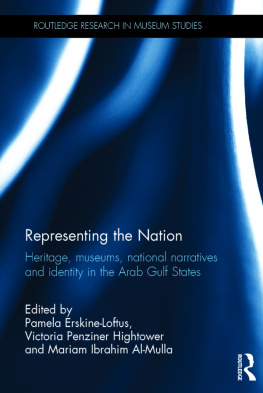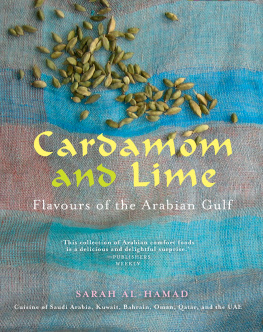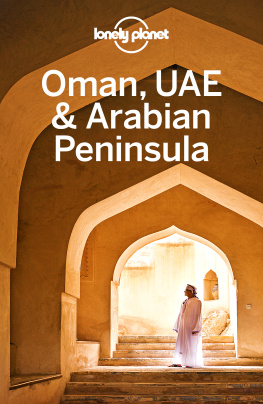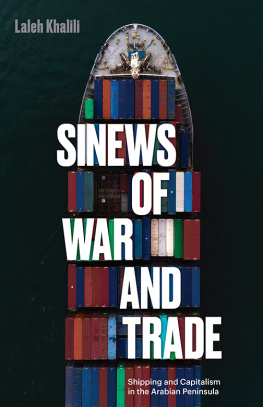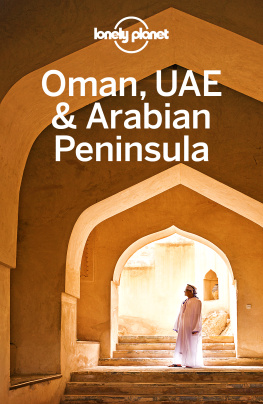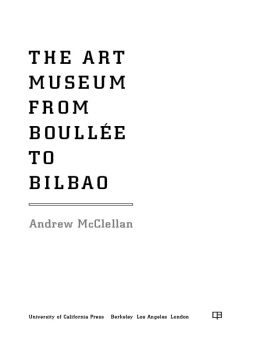
MODERNITY AND THE MUSEUM IN THE ARABIAN PENINSULA
Modernity and the Museum in the Arabian Peninsula is dedicated to the recent and rapid high-profile development of museums in the Arabian Peninsula, focusing on the states of Bahrain, Kuwait, Qatar and the UAE. These Gulf states are dynamically involved in the establishment of museums to preserve and represent their distinct national culture and heritage, as well as engaging in the regional and global art worlds through the construction of ultra-modern art museums. Alongside such developments there exists a rich world of collecting and displaying material culture in homes and private museums that is little known to the outside world.
Museum studies literature has struggled to keep pace with such developments and Modernity and the Museum in the Arabian Peninsula is the first book to coherently present:
a contemporary overview of the ever-evolving landscape of museums and related heritage projects in the Arabian Peninsula;
a critical evaluation of the nature of these museum projects within the political and cultural conditions in the Arabian Peninsula; and
suggestions for productive ways forward for museum developments in the region.
Museum studies students and museum professionals now have a book that fills an important gap in the picture of the museum worldwide. Contextualising this study in the history and politics of the region, from a scholar working within the region, this in-depth overview and critical analysis of museums in the Arabian Peninsula stands alone as an entry into this important topic.
Karen Exell is Honorary Senior Research Associate at UCL Qatar. She has over 15 years experience of museums and heritage, and has been teaching museum studies in Qatar for the past four years and advising on the development of regional museum projects. Prior to this she worked as a curator and lecturer in the UK. Karens research interests include the role and meaning of museums outside the West, and museums and the construction of knowledge.
MODERNITY AND THE MUSEUM IN THE ARABIAN PENINSULA
Karen Exell
First published 2016
by Routledge
2 Park Square, Milton Park, Abingdon, Oxon OX14 4RN
and by Routledge
711 Third Avenue, New York, NY 10017
Routledge is an imprint of the Taylor & Francis Group, an informa business
2016 Karen Exell
The right of Karen Exell to be identified as author of this work has been asserted by her in accordance with sections 77 and 78 of the Copyright, Designs and Patents Act 1988.
All rights reserved. No part of this book may be reprinted or reproduced or utilised in any form or by any electronic, mechanical, or other means, now known or hereafter invented, including photocopying and recording, or in any information storage or retrieval system, without permission in writing from the publishers.
Trademark notice: Product or corporate names may be trademarks or registered trademarks, and are used only for identification and explanation without intent to infringe.
British Library Cataloguing-in-Publication Data
A catalogue record for this book is available from the British Library
Library of Congress Cataloging-in-Publication Data
Names: Exell, Karen.
Title: Museums in the Arabian Peninsula : globalisation and the politics of representation / Karen Exell.
Description: Milton Park, Abingdon, Oxon : Routledge, 2016. Includes index.
Identifiers: LCCN 2015035823| ISBN 9780415744904 (hardback : alkaline paper) | ISBN 9780415744911 (paperback : alkaline paper) | ISBN 9781315641102 (e-book) Subjects: LCSH: Museums--Arabian Peninsula. | Museums--Political aspects--Arabian Peninsula. | Museums--Social aspects--Arabian Peninsula. | Globalization--Political aspects--Arabian Peninsula. | Globalization--Social aspects--Arabian Peninsula. | Social change--Arabian Peninsula. | Historic prservation--Arabian Peninsula. | Nationalism--Arabian Peninsula. | Arabian Peninsula--Cultural policy.
Classification: LCC AM79.4 .E94 2016 | DDC 069.0953--dc23
LC record available at http://lccn.loc.gov/
2015035823
ISBN: 978-0-415-74490-4 (hbk)
ISBN: 978-0-415-74491-1 (pbk)
ISBN: 978-1-315-64110-2 (ebk)
Typeset in Bembo
by Sunrise Setting Ltd, Paignton, UK
I would like to dedicate this volume to my students on the MA in Museum and Gallery Practice at UCL Qatar, who provided insight and inspiration throughout the research and writing process, and to Oscar, the ideal writing companion. To my family also, as ever, and in particular to Beth.
CONTENTS
.
When I moved to Qatar in 2011 to set up the MA in Museum and Gallery Practice at UCL Qatar, the Doha campus of University College London, the Museum of Islamic Art and Mathaf: Arab Museum of Modern Art had been in operation for just a few years, and the suite of Saadiyat Island Cultural District museums, including the planned Louvre Abu Dhabi and Guggenheim Abu Dhabi, had recently been initiated. The worlds attention was on the region as these spectacular projects took shape, and it seemed to many that they epitomised all there was to know about museums in the region. However, it soon became clear that while these projects represent a high-profile state-level agenda of branding and global engagement, they are far from representative, and the museum landscape beyond them was rich and deep. In addition, there was a lack of literature on the new projects that took an analytical stance, and almost nothing on the museums and collections beyond them. This book came into being as a result of my own curiosity about regional museological processes and what they meant on the ground, as opposed to in the Western media, the need to develop literature that could support the teaching of a regionally focused museum studies postgraduate programme, and a desire to inform a wider audience of the nature of museums and collecting practices, in themselves informative of broader contemporary socio-cultural and political processes at work in the Arabian Peninsula region. The book is the final stage of a four-year project that has encompassed a conference, Museums in Arabia at the Museum of Islamic Art, Doha, in June 2014 (supported by the Qatar National Research Fund and UCL Qatar), and two co-edited volumes, Cultural Heritage in the Arabian Peninsula: Debates, Discourses and Practices (Ashgate, 2014) and Museums in Arabia: Transnational Practices and Regional Processes (Ashgate, 2016, forthcoming). It offers a snapshot of the museological landscape in the Arabian Peninsula during the period 201215, capturing the range of practices and processes at work in this rapidly transforming region, as a contribution to a broader understanding of an aspect of regional cultural production at a specific moment in time.
I would like to thank first and foremost all the people who gave their time to meet me and discuss their museums and collections over the course of the last four years, many of whom wish to remain anonymous, and this has been respected. In particular, I would like to thank Saif Marzooq Al Shamlan, who invited me to attend his diwaniyya in Kuwait and visit his private museum, and his son Faisal Al Shamlan, who hosted me during my stay in Kuwait in August 2014. Throughout the research process, Mohammed Al Sayegh has been extremely helpful arranging meetings and setting up connections in Qatar and Kuwait, and deserves special thanks. Sheikh Faisal bin Qassim Al Thani and his daughter, Al Anood, kindly gave their time to be interviewed in the early stages of the work. The artists Ben Barbour and Monira Al Qadiri have generously given me images of their work to use, and indeed, a talk given by Monira Al Qadiri in Mathaf in 2015 was particularly inspiring in relation to the spectacular new museums under construction. Throughout the last four years my students on the MA in Museum and Gallery Practice have proved insightful in their comments and observations on regional developments, and indeed I have included some of their research within the forthcoming discussions. Rob Carter, Professor of Arabian and Middle Eastern Archaeology at UCL Qatar, provided valuable feedback on the first two chapters, and my research assistant, Giorgio Piga was indispensable in supporting the preparation of the manuscript and as the first reader. Finally, I am grateful to UCL Qatar for the provision of research funding to allow this project to be completed.


